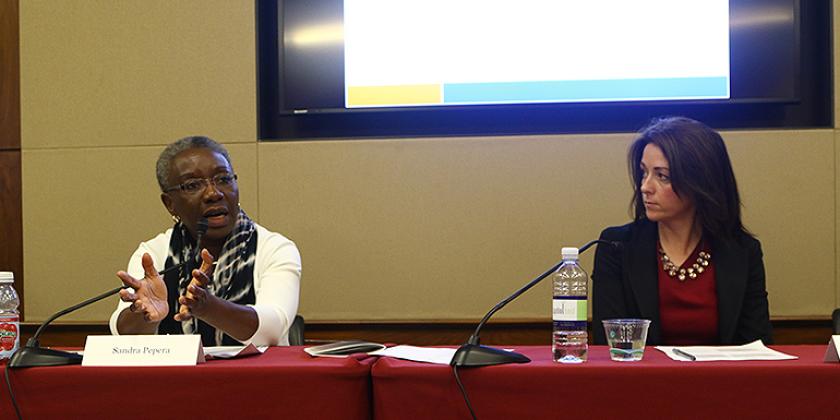
Mitigating Violence Against Women in Crises and Political Transitions
On May 19, 2016, the International Foundation for Electoral Systems (IFES) and the Office of Congresswoman Sheila Jackson Lee (TX-18) hosted “Mitigating Violence Against Women in Crises and Political Transitions,” the sixth installment of the “Women, Peace and Security” Capitol Hill breakfast briefing series.
Bill Sweeney, IFES President and CEO, opened the event by highlighting IFES’ work with the National Democratic Institute (NDI) and International Republican Institute to prioritize the meaningful inclusion of women as decision-makers and active participants in all aspects of the democratic process. He cited former United Nations Secretary-General Kofi Annan, who has referred to violence against women as a problem of “pandemic proportions, where one in three women have been abused in her lifetime.” Jessica Huber, IFES Senior Gender Specialist, then introduced the panel, which was comprised of Aisling Swaine, Associate Professor of Practice of International Affairs at the George Washington University’s Elliott School of International Affairs; Sandra Pepera, NDI Director for Gender, Women and Democracy; and Rakesh Sharma, IFES Director of Monitoring and Evaluation and Public Opinion Research.
Swaine opened the panel by framing violence against women during conflict and political contestation, which has existed from the Roman wars to the present moment but is now recognized as an international crime. She considers “violence against women a backdrop to their lives,” across both the public and private spheres. Even after conflict, Swaine has found that violence varies globally and often continues in different forms by different actors. The international community has responded with a number of resolutions over the years to counter these various forms of violence, and 63 United Nations member states, including the United States, have subsequently developed national action plans to implement these resolutions.
In then considering violence within the political realm, Pepera highlighted the International Day for the Elimination of Violence against Women and reflected on the reality that “women who step into political life [are] often under threat.” NDI recently launched its #NotTheCost campaign, a global call to action to stop violence against women in politics. Pepera noted that such violence “targets women on the basis of gender, takes on a gendered form,” and ultimately “undermines the integrity of democracy.” She reiterated Swaine’s point that violence occurs across public and private spaces, including online, and stated that gender-based violence can be exacerbated by conflict and an individual’s age, race, and ethnicity. Pepera recommended a holistic approach in responding to violence against women in politics and highlighted actions already taken by United Nations Special Rapporteurs, civil society, and the digital community.
Sharma then provided an overview of the development of and findings from IFES’ Violence Against Women in Elections (VAWIE) project, which is studying the issue and developing tools to address it. The project is funded by the U.S. Agency for International Development and has already confirmed several research hypotheses: (1) there is a general lack of knowledge and data about VAWIE; (2) current data collection, research, and programming efforts related to electoral violence have a gender bias; (3) women experience different types of violence in different spaces than men; and (4) there is a lack of programming to address VAWIE specifically. The program has created an updated typology specifically focused on the impact of election violence on women, developed an assessment methodology, updated IFES’ election violence monitoring tools, and provided programmatic recommendations.
The panelists took several questions from audience members about the role of law enforcement, the defense sector, protection against retaliation for reporting political violence, and recent #HeForShe campaigns. To conclude the event, Congresswoman Jackson Lee – occupied with a vote on the House floor – called into the briefing to provide remarks. She emphasized that the “Women, Peace and Security” series is “imperative and important” and part of her “continuing effort to ensure freedom, peace, and justice” for women around the world. Sweeney then restated the import of the day’s conversation and urged all in attendance to take action.
To view a photo gallery of the event, please click here.
IFES’ next “Women, Peace and Security” briefing on “Engaging Men and Boys as Allies in Peace-building” will be held on Thursday, July 21, 2016. To RSVP, please contact Liz Sidell at esidell@ifes.org.









